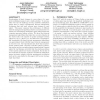NETGAMES
2006
ACM
15 years 8 months ago
2006
ACM
ÌÓ Ô ÓÒÐ Ò Ñ × ÒØ Ö ×Ø Ò ØÓ Ø Ö ÔÐ Ý Ö׸ Ø × Ñ¹ ÔÓÖØ ÒØ ØÓ Ø Ø ÔÐ Ý Ö׳ Ú ÓÖ׺ ÁÒ Ø × Ô Ô Ö¸ Ò ÓÖ Ö ØÓ ÙÒ Ö×Ø ...
103
click to vote
NETGAMES
2006
ACM
15 years 8 months ago
2006
ACM
Consistency maintenance of replicated data in multiplayer games is a challenging issue due to the performance constraints of real-time interactive applications. We present an appr...
118
click to vote
NETGAMES
2006
ACM
15 years 8 months ago
2006
ACM
In this paper we report on our work to enable “laid-back” social interactions using television as a primary interaction medium and mobile devices that participate as a seconda...
130
click to vote
NETGAMES
2006
ACM
15 years 8 months ago
2006
ACM
Massive multiplayer online games (MMOGs) are today the driving factor for the development of distributed interactive applications, and they are increasing in size and complexity. ...
129
click to vote
NETGAMES
2006
ACM
15 years 8 months ago
2006
ACM
As technologies evolve and computer systems shrink to the size of matchboxes, also their field of application shifts in new directions. Our permanent companions, mobile phones, p...
112
click to vote
NETGAMES
2006
ACM
15 years 8 months ago
2006
ACM
Broadcasting all state changes to every player of a massively multiplayer game is not a viable solution. To successfully overcome the challenge of scale, massively multiplayer gam...
295
click to vote
NETGAMES
2006
ACM
15 years 8 months ago
2006
ACM
In recent years, MMORPG has become popular. In order to improve scalability of game system, several P2P-based architectures have been proposed. However, in P2P-based gaming archit...
102
click to vote
NETGAMES
2006
ACM
15 years 8 months ago
2006
ACM
— A practical pricing mechanism is the foundation for the deploying of IP multicast in the inter-domain Internet. The IP multicast service model and its pricing mechanism are dis...
123
click to vote
NETGAMES
2006
ACM
15 years 8 months ago
2006
ACM
Massively Multiplayer Online Games (MMOG) require novel, scalable network architectures for a high amount of participating players in huge game worlds. Consequently, new and compl...
129
click to vote
NETGAMES
2006
ACM
15 years 8 months ago
2006
ACM
This paper proposes a hybrid architecture for distributed virtual environments, utilizing servers alongside peer-to-peer components. Current research into peer-based systems seeks...




